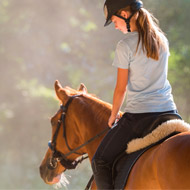New research on pain-associated behaviour in horses presented

Pain in horses will always be elusive due to their natural ability to conceal weakness in the wild.
Dr Sue Dyson, Head of Clinical Orthopaedics at the Centre of Equine Studies at the Animal Health Trust, presented two of her studies of work at the Saddle Research Trust Conference on 8 December 2018.
One study revealed how ill-fitting saddles and heavier riders can result in back pain and tension in the horse. Four riders of similar ability, but with different bodyweights, each rode a horse which was then assessed for changes in back dimensions and responses to thoracolumbar palpation. Gait, signs of stress, behaviour and forces under the saddle were also evaluated as part of the study.
The results concluded that the heavier the rider, the greater the pressure under the saddle. With heavier riders, the thoracolumbar dimensions decreased (an opposite effect to that of light and medium riders) and was associated with pain and tension in the horse’s back.
Dr Dyson emphasised that the implication is not that heavy riders should not ride; but rather that a suitable horse with a saddle that is properly fitted for both horse and rider is imperative in order to reduce the potential for pain and performance decline.
The second study demonstrated how an ethogram based on 24 ridden behaviours to assess pain and lameness could be accurately used by trained and untrained assessors alike. In part of the study, the ethogram was applied to 21 video recordings of horses before and after diagnostic analgesia by a trained experienced analyst as well as 10 people who had not been trained. The results showed that all observers recognised a highly significant decrease in overall scores after diagnostic analgesia. A trained assessor is required, however, for accurate analysis.
Dr Dyson commented: “Pain in horses has always been elusive because, in their capacity as flight animals, they will naturally conceal it to hide weakness or vulnerability.
“As our knowledge of the ridden horse’s inherent weight-bearing capacity increases, the ethogram presents a useful monitoring tool: horses in pain may be silent, but behaviour is their voice and we need to listen and be receptive.”



 The latest
The latest